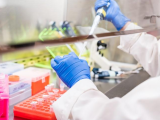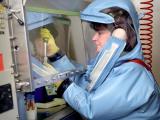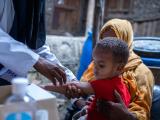Mar 4, 2004 (CIDRAP News) A new government-wide effort to sustain the cutting-edge life sciences research for which the United States is known but to also guard against misuse of the knowledge and technologies growing from this research was announced today by Health and Human Services (HHS) Secretary Tommy Thompson. Concern over "dual use" research, that is, legitimate scientific work that could be misused to threaten public health or national security, has grown as the potential for terrorism increases.
HHS's first step in this effort is creation of a new board, called the National Science Advisory Board for Biosecurity (NSABB). The board will "advise on and recommend specific strategies for the efficient and effective oversight of federally conducted or supported potential dual-use biological research taking into consideration both national security concerns and the needs of the research community," according to an HHS press release.
Says John H. Marburger III, director of the White House Office of Science and Technology Policy, "Creating the NSABB is a major step in a longer process of outreach and education to scientists in the United States and internationally. It is imperative that we develop this new framework to address serious concerns that range from personal responsibility to national security."
The board, which will be managed by the National Institutes of Health (NIH), will advise the secretary of HHS, the director of NIH, and the heads of all federal departments and agencies doing or supporting life sciences research, says the release. Specific responsiblities include:
- Advising on strategies for local and federal biosecurity oversight for all federally funded or supported life sciences research
- Advising on the development of guidelines for biosecurity oversight of life sciences research and providing ongoing evaluation and modification of these guidelines as needed
- Advising on strategies to work with journal editors and other stakeholders to ensure the development of guidelines for the publication, public presentation, and public communication of potentially sensitive life sciences research
- Advising on the development of guidelines for mandatory programs for education and training in biosecurity issues for all life scientists and laboratory workers at federally funded institutions
- Providing guidance on the development of a code of conduct for life scientists and laboratory workers that can be adopted by federal agencies as well as professional organizations and institutions engaged in the performance of life sciences research domestically and internationally
HHS, in collaboration with the Department of States and other agencies, plans to work through international scientific and health organizations and other relevant international groups to extend the biosecurity policies developed under NSABB's advisory to the wider international science community on a voluntary and cooperative basis.
The board will have up to to 25 voting members from scientific fields including molecular biology, microbiology, infectious diseases, laboratory biosafety and biosecurity, public health/epidemiology, health physics, pharmaceutical production, veterinary medicine, plant health, food production, bioethics, national security, biodefense, intelligence, law/law enforcement, and scientific publishing. In addition, members of at least 15 federal departments and agencies will be ex officio members.
See also:
National Research Council report: "Biotechnology research in an age of
terrorism: confronting the 'dual use' dilemma"
http://www.nap.edu/books/0309089778/html/
Web page describing NSABB
http://www.biosecurityboard.gov

















